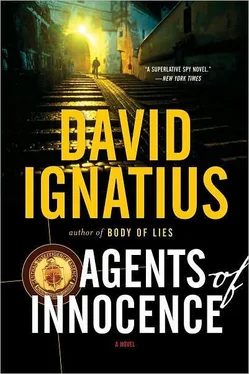David Ignatius - Agents of Innocence
Здесь есть возможность читать онлайн «David Ignatius - Agents of Innocence» весь текст электронной книги совершенно бесплатно (целиком полную версию без сокращений). В некоторых случаях можно слушать аудио, скачать через торрент в формате fb2 и присутствует краткое содержание. Жанр: Шпионский детектив, на английском языке. Описание произведения, (предисловие) а так же отзывы посетителей доступны на портале библиотеки ЛибКат.
- Название:Agents of Innocence
- Автор:
- Жанр:
- Год:неизвестен
- ISBN:нет данных
- Рейтинг книги:3 / 5. Голосов: 1
-
Избранное:Добавить в избранное
- Отзывы:
-
Ваша оценка:
- 60
- 1
- 2
- 3
- 4
- 5
Agents of Innocence: краткое содержание, описание и аннотация
Предлагаем к чтению аннотацию, описание, краткое содержание или предисловие (зависит от того, что написал сам автор книги «Agents of Innocence»). Если вы не нашли необходимую информацию о книге — напишите в комментариях, мы постараемся отыскать её.
Agents of Innocence — читать онлайн бесплатно полную книгу (весь текст) целиком
Ниже представлен текст книги, разбитый по страницам. Система сохранения места последней прочитанной страницы, позволяет с удобством читать онлайн бесплатно книгу «Agents of Innocence», без необходимости каждый раз заново искать на чём Вы остановились. Поставьте закладку, и сможете в любой момент перейти на страницу, на которой закончили чтение.
Интервал:
Закладка:
“24 September, Paris. 10:00.” September 24, the day that a flight would be leaving Paris for Tel Aviv.
“8 October, 9:15.” The return flight from Tel Aviv to Paris.
“331-74-26-85.” The number of the Israeli Embassy in Paris, to be called only in case of an emergency.
Levi checked his watch. It was exactly 11:25 A.M. He looked over his shoulder once more and then crossed himself, in case anyone was watching. He felt ridiculous. A Jew, crossing himself before a Catholic shrine, on a dusty lane in an Arab country. It was too absurd. He continued on his way and eventually arrived back in Jounie in time for his business meeting.
The Israeli intelligence officer had left behind, in the roadside shrine, a message for a contact who, he had been told, was active in the Maronite Church. The message was an abbreviated itinerary for a trip the contact would be making to Israel in two months. The trip had been arranged at a level of the Israeli government far higher than Levi. The nominal purpose would be to visit the handful of Maronite religious institutions that still existed in Israel. But the Maronite cleric would be attending other meetings, with a range of Israeli government officials. It was a promising sign, the Mossad officials told each other, that the Maronite priest wanted to keep the contacts secret. That meant he had something to hide. Which suggested, in turn, that he was a serious man.
At noon, a lone figure appeared on the dirt road. He was dressed in a black cassock, wearing a gold cross. He carried in his hand a breviary, which was stamped in gold with his name: “Pere Maroun Lubnani-L’Universite du Saint-Esprit de Kaslik.” The priest walked to the shrine, removed a piece of paper, said a brief prayer, and, after making the sign of the cross, turned and walked back down the road.
There was a blizzard of cables from Langley that summer, so many that Rogers gave up trying to read them. All hell was breaking loose in Jordan. In early June, Palestinian commandos had ambushed the king’s motorcade and nearly killed him. Heavy fighting had erupted across Amman. The next day, the Popular Front for the Liberation of Palestine had seized the Intercontinental Hotel, across the street from the American Embassy, and held eighty-eight hostages at gunpoint.
The crisis passed, but the Americans were becoming frantic. The king seemed paralyzed and unwilling to order the Jordanian Army to crush the guerrillas. The new Jordanian cabinet was said to have a pro-fedayeen majority. There were rumors that the Old Man was meeting openly with leading Jordanian politicians and sounding them out about becoming prime minister in a PLO government, once the commandos had toppled the Hashemite regime.
CIA headquarters was more eager than ever to recruit a top-level agent in Fatah. Marsh himself had assumed operational control of the recruitment of Jamal, following the botched meeting in Cairo. He was going to meet with the Palestinian-himself-and set things right.
Marsh cabled Hoffman in early July with details of the meeting with Jamal. They would rendezvous at a hotel in Rome. A support agent from the Beirut station should accompany the Palestinian. There would be a new arrangement for running the operation after the Rome meeting, once control had been established.
Hoffman asked Rogers to meet one last time with the Palestinian and brief him on the details of the Rome meeting.
They met at the safehouse in Ramlet el-Baida, on the coast. Jamal arrived without his black leather jacket, in deference to the midsummer heat. He wore a white T-shirt and blue jeans, which made him look even more than usual like Marlon Brando.
Rogers shook the Palestinian’s hand. Jamal kissed him on both cheeks. He seemed genuinely pleased to see the American case officer again, for the first time since their aborted meeting in Egypt.
“The last time I saw you,” said Rogers, “you were running down the stairs in a pair of sandals and a suit that didn’t quite fit. Evidently you survived the ordeal.”
“I enjoyed it!” said Jamal. “It was like a cowboy movie.”
“I didn’t enjoy it,” said Rogers. He looked at his watch.
“I don’t have much time, so listen to me carefully,” continued the American. “A very senior official of the American government wants to meet with you. He would like to continue the discussions you and I have begun.”
“Fine,” said Jamal. “If he understands the arrangement that you and I have reached, why not?”
Rogers said nothing. He took a piece of paper from his pocket and handed it to Jamal.
“This is the address of the hotel in Rome where he will meet you and the time and day of the meeting. Fuad will go with you. He will give you money for the trip and arrange any other details.”
“When will you arrive?” said Jamal, lighting a cigarette and taking a deep drag.
“I won’t,” said Rogers. “I’m not coming to the Rome meeting.”
“Why not?” asked Jamal.
“I’m busy with other work. And I think it’s important that you and the senior official have a chance to talk alone.” Rogers sounded almost convincing.
Jamal nodded his head, but he wasn’t pleased.
“I would prefer that you be there,” said Jamal.
“That isn’t an option,” said Rogers.
“Why not?” asked Jamal. “What has changed?”
“Nothing,” said Rogers. “Don’t complain about meeting someone from headquarters. It’s a sign that we’re serious.”
“But my understanding was with you, not the American government.”
“It’s the same thing,” said Rogers.
“What about your promises in Kuwait?”
“Stop it!” snapped Rogers. “You may think the world revolves around you and the Old Man, but it doesn’t. There are lots of other things going on, and I have other responsibilities. I’m not a babysitter.”
Jamal was stung. His expression had turned from enthusiasm to concern, and now to an angry silence. Rogers hated to wound him, but saw no other way to make the break that was necessary.
Jamal rose from his chair. He put the sheet of paper with the instructions on it in the pocket of his blue jeans and headed for the door. He had his hand on the door knob when he stopped and turned back toward Rogers.
“Will we meet again?” asked Jamal. There was something of the child in his voice.
“Of course,” said Rogers. “Don’t be melodramatic.”
“I have another Arab proverb for you to add to your collection,” said Jamal.
“What’s that?” asked Rogers.
“ ‘Entertain the Bedouin and they will steal your clothes.’ ”
Jamal let himself out the door. Rogers sat alone in the apartment for a few minutes and then went back to the embassy and his paperwork.
23
Rome; July 1970
Rome was hot and sticky. The vines on the stone walls in the Villa Borghese looked wilted. The shops on Via Frattina closed early for the afternoon siesta. Even the lizards on the Palatine Hill hid beneath the rocks until it was dark.
Marsh made a point of not minding the heat. He believed that physical sensations, like fatigue or fear or heat itself, could be overcome by an exercise of will. With this in mind, he had purchased a pair of sunglasses when he arrived in Rome: the kind with thick black frames that the Italians liked. They made him feel cooler. So did his suit, a blue suit of tropical wool made by the tailor in Hong Kong he had befriended when he was stationed there. Many of his colleagues had left Asia in the 1960s with bullet wounds. Marsh had left with suits.
“Anyone for tennis?” Marsh asked his luncheon companions. They were eating at Il Buco, a small outdoor restaurant on Via Sant’Ignazio near the Pantheon. The other luncheon guests, sweating in the midday heat, looked incredulously at the visiting American. Except for a vivacious young Italian woman named Anna Armani. She was married to one of the generals who headed the Servizio Informazione Difesa, as the Italian intelligence service was then called.
Читать дальшеИнтервал:
Закладка:
Похожие книги на «Agents of Innocence»
Представляем Вашему вниманию похожие книги на «Agents of Innocence» списком для выбора. Мы отобрали схожую по названию и смыслу литературу в надежде предоставить читателям больше вариантов отыскать новые, интересные, ещё непрочитанные произведения.
Обсуждение, отзывы о книге «Agents of Innocence» и просто собственные мнения читателей. Оставьте ваши комментарии, напишите, что Вы думаете о произведении, его смысле или главных героях. Укажите что конкретно понравилось, а что нет, и почему Вы так считаете.












